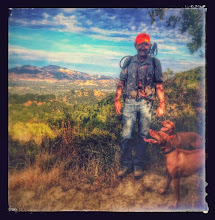If your dog does come down with symptoms of Valley Fever, your vet may not know this is a possible diagnosis.  |
| Bailey is still getting thinner but his fever is dropping. |
 |
| A dog's lungs full of the Valley Fever spores |
Prevention
Unfortunately, there is not a vaccine to prevent this disease. Reassuringly it is important to recognize that many dogs will never become ill from the fungus. The best pet owners can do is to be aware of symptoms and respond quickly to signs of the disease in their dog.
As the fungus is found in outdoor areas, obviously dogs that spend a lot of time outdoors are more likely to inhale the spores than dogs that spend a lot of time indoors. Things you can do to reduce the likelihood of your dog's exposure to the fungus are:
- avoid activities that generate dust
- reduce digging behavior by dogs
- prevent sniffing in rodent holes
- keep dogs indoors more than outdoors
- be aware of areas that have outbreaks
- Hiking/ hunting areas such as in the native desert environment
- Dust storms
- New construction developments
- Recent pool digs or landscaping
- Wet weather followed by hot weather
Unfortunately, with weather patters in the southwestern United States changing to include hotter temperatures and more intense dust storms, Valley Fever will continue to grow in presence.
For those who want to REALLY learn more, here is a excelllent 40 page report from the University of Arizona. https://www.vfce.arizona.edu/resources/pdf/Tutorial_for_Primary_Care_Professionals.pdf
"It’s important to note that infection resulting from respiratory exposure to an infected patient has never been reported, and patients with Valley Fever need not be isolated from others. "









1 comment:
Great info as usual Rod - happy to hear that Bailey's fever is down!!!!
Post a Comment